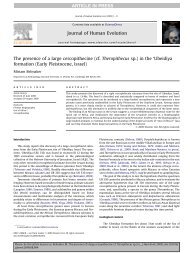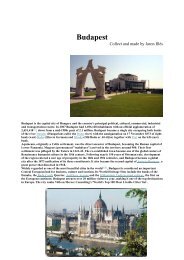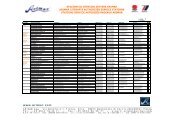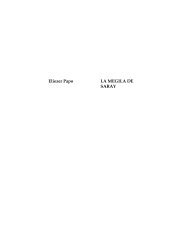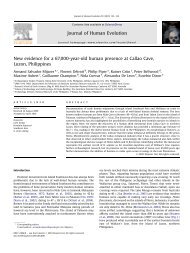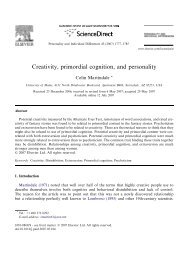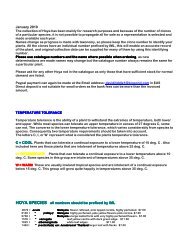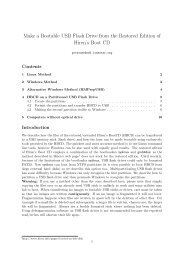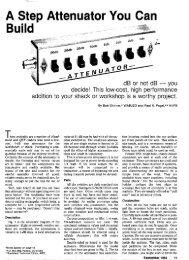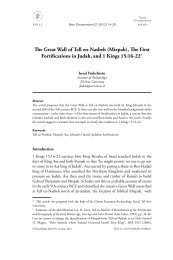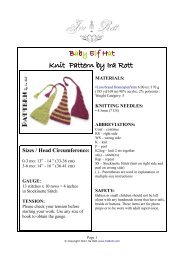David in the Service of King Achish of Gath: Renegade to His ...
David in the Service of King Achish of Gath: Renegade to His ...
David in the Service of King Achish of Gath: Renegade to His ...
You also want an ePaper? Increase the reach of your titles
YUMPU automatically turns print PDFs into web optimized ePapers that Google loves.
84 Y. Shemesh / Vetus Testamentum 57 (2007) 73-90<br />
camp, he def<strong>in</strong>es Saul as <strong>David</strong>’s lord and <strong>the</strong> Hebrew warriors as <strong>the</strong> servants<br />
<strong>of</strong> Saul: “So rise early <strong>in</strong> <strong>the</strong> morn<strong>in</strong>g, you and your lord’s servants who came<br />
with you—rise early <strong>in</strong> <strong>the</strong> morn<strong>in</strong>g, and leave as soon as it is light”<br />
(1 Sam. xxix 10). We should note that all this is said immediately aft er <strong>David</strong><br />
expresses <strong>to</strong> <strong>Achish</strong> his displeasure that he is not be<strong>in</strong>g given an opportunity<br />
<strong>to</strong> fight “aga<strong>in</strong>st <strong>the</strong> enemies <strong>of</strong> my lord <strong>the</strong> k<strong>in</strong>g” (1 Sam. xxix 8). What is<br />
more, <strong>David</strong>’s desire <strong>to</strong> fight aga<strong>in</strong>st <strong>the</strong> enemies <strong>of</strong> “my Lord <strong>the</strong> k<strong>in</strong>g” echoes<br />
Saul’s language when he agreed <strong>to</strong> make <strong>David</strong> his son-<strong>in</strong>-law <strong>in</strong> exchange for<br />
his mak<strong>in</strong>g war on <strong>the</strong> Philist<strong>in</strong>es: “be my warrior and fight <strong>the</strong> battles <strong>of</strong> <strong>the</strong><br />
Lord” (1 Sam. xviii 17) and take “vengeance on <strong>the</strong> k<strong>in</strong>g’s enemies” (v. 25).<br />
5. Th e reference <strong>to</strong> <strong>the</strong> battle <strong>in</strong> <strong>the</strong> Elah Valley, <strong>in</strong> which <strong>David</strong> played a<br />
decisive role <strong>in</strong> <strong>the</strong> vic<strong>to</strong>ry over <strong>the</strong> Philist<strong>in</strong>es: To rem<strong>in</strong>d <strong>Achish</strong> <strong>of</strong> <strong>David</strong>’s<br />
popularity <strong>in</strong> Israel and <strong>of</strong> <strong>the</strong> danger he poses <strong>to</strong> <strong>the</strong> Philist<strong>in</strong>es, <strong>the</strong> commanders<br />
quote <strong>the</strong> praises <strong>of</strong> <strong>David</strong> sung all over Israel: “Remember, he is <strong>the</strong><br />
<strong>David</strong> <strong>of</strong> whom <strong>the</strong>y sang as <strong>the</strong>y danced: ‘Saul has sla<strong>in</strong> his thousands;<br />
<strong>David</strong>, his tens <strong>of</strong> thousands’” (1 Sam. xxix 5). Of course <strong>the</strong> commanders do<br />
not state so outright, but readers are well aware that those thousands and ten<br />
thousands sla<strong>in</strong> by <strong>David</strong>, <strong>in</strong> <strong>the</strong> song <strong>the</strong>y quote, are none o<strong>the</strong>r than <strong>the</strong><br />
Philist<strong>in</strong>es <strong>the</strong>mselves, and that <strong>the</strong> song <strong>in</strong> question was composed aft er<br />
<strong>David</strong> had fought aga<strong>in</strong>st Goliath and <strong>the</strong> Philist<strong>in</strong>es <strong>in</strong> <strong>the</strong> Elah Valley<br />
(1 Sam. xviii 7). 25<br />
Th e s<strong>to</strong>ry <strong>of</strong> <strong>the</strong> Gilboa campaign resembles that <strong>of</strong> <strong>the</strong> Elah Valley <strong>in</strong> several<br />
ways. In both cases <strong>the</strong> Philist<strong>in</strong>es <strong>in</strong>itiated <strong>the</strong> hostilities; <strong>in</strong> both we<br />
read <strong>of</strong> <strong>the</strong> preparations for <strong>the</strong> battle and <strong>of</strong> <strong>the</strong> disposition <strong>of</strong> <strong>the</strong> oppos<strong>in</strong>g<br />
camps (1 Sam. xvii 1-3, 21; xxviii 4). On both occasions Saul’s fear <strong>of</strong> <strong>the</strong><br />
Philist<strong>in</strong>es is emphasized (1 Sam. xvii 11, 32; xxviii 5). In both wars <strong>David</strong><br />
asks <strong>the</strong> k<strong>in</strong>g (Saul <strong>in</strong> <strong>the</strong> former case, <strong>Achish</strong> <strong>in</strong> <strong>the</strong> latter) for permission <strong>to</strong><br />
take part <strong>in</strong> <strong>the</strong> battle and tries <strong>to</strong> conv<strong>in</strong>ce him <strong>of</strong> his suitability for this<br />
(1 Sam. xvii 32, 34-37; xxix 8). Th e doubts about <strong>David</strong>’s military abilities<br />
cause his request <strong>to</strong> do battle with Goliath <strong>to</strong> be refused <strong>in</strong>itially (1 Sam. xvii 33).<br />
25) Cf. F. S<strong>to</strong>lz, Das Erste und Zweite Buch Samuel (ZBK 9; Zürich, 1981), p. 176. I do not,<br />
however, accept his assertion (ibid.), shared by S<strong>to</strong>ebe (Das Erste Buch Samuelis,<br />
p. 502), that s<strong>in</strong>ce <strong>in</strong> <strong>the</strong> end <strong>David</strong> is released from service and sent away, <strong>the</strong> question <strong>of</strong> what<br />
he would have done if he had been forced <strong>to</strong> participate <strong>in</strong> <strong>the</strong> battle is out <strong>of</strong> place. S<strong>to</strong>lz<br />
ma<strong>in</strong>ta<strong>in</strong>s that this is a “typically modern question,” but I see no reason <strong>to</strong> assume that modern<br />
readers are any different than ancient readers and listeners <strong>in</strong> such matters. It is only natural<br />
that a question associated with <strong>the</strong> extend <strong>of</strong> <strong>David</strong>’s loyalty <strong>to</strong> <strong>the</strong> k<strong>in</strong>g <strong>of</strong> Israel and <strong>the</strong> people<br />
<strong>of</strong> Israel would also engage <strong>the</strong> ancient audience for <strong>the</strong> s<strong>to</strong>ry.




